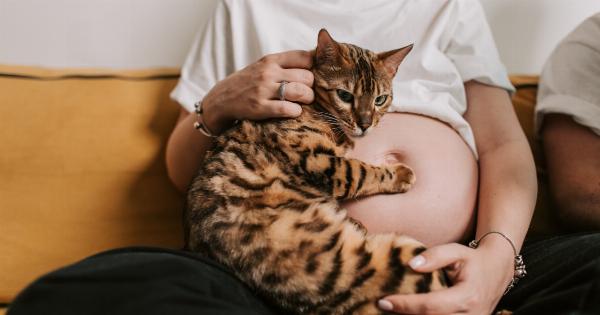Many people believe that pregnant women should avoid contact with cats due to the risk of contracting toxoplasmosis, a disease caused by the parasitic organism Toxoplasma gondii.
While it is true that toxoplasmosis can be a serious concern during pregnancy, it is not necessary to get rid of your beloved feline friend. In this article, we will discuss the facts about toxoplasmosis, how it can affect pregnancy, how to prevent it, and whether or not it is safe to keep a cat while pregnant.
What Is Toxoplasmosis?
Toxoplasmosis is a parasitic infection caused by the Toxoplasma gondii organism. This parasite is commonly found in the feces of infected cats, as well as in other animals, including birds, rodents, and livestock.
Humans can become infected with toxoplasmosis by coming into contact with contaminated cat litter, soil, or water, or by eating undercooked or contaminated meat.
Most people who are infected with toxoplasmosis do not experience any symptoms at all. However, in rare cases, infection can cause flu-like symptoms, including fever, headache, muscle aches, and fatigue.
In people with weakened immune systems, toxoplasmosis can cause serious complications such as seizures or blindness.
Toxo and Pregnancy
For most healthy individuals, contracting toxoplasmosis is not a major concern. However, for pregnant women, the risk of contracting the disease can be a significant concern.
In pregnant women who have never been exposed to the Toxoplasma gondii parasite before, infection can cause a miscarriage or serious birth defects in the developing fetus.
In some cases, a pregnant woman may become infected with toxoplasmosis and never show any symptoms herself. However, if she is carrying the parasite, it can still be passed on to her developing fetus and cause serious complications.
Depending on the timing of the infection, the risk of complications can range from low to high.
Preventing Toxoplasmosis During Pregnancy
The good news is that there are several simple precautions that pregnant women can take to reduce their risk of contracting toxoplasmosis:.
Avoid Undercooked Meat
It is important to cook all meat, poultry, and fish thoroughly to reduce the risk of toxoplasmosis. Meat should be cooked to an internal temperature of at least 165 degrees Fahrenheit to kill any potential parasites.
Wash Hands and Surfaces
Wash hands, cutting boards, and utensils thoroughly with soap and water after handling raw meat. Avoid cross-contamination by keeping raw meats separate from other foods in your shopping cart, fridge, and pantry.
Avoid Unwashed Produce
Wash all fruits and vegetables thoroughly before eating to remove any potential contaminants.
Avoid Cat Litter
While it is possible to contract toxoplasmosis from contact with contaminated soil or water, the most common source of infection is exposure to cat feces. Pregnant women should avoid changing cat litter if possible.
If you must change litter, wear gloves and a facemask, and wash your hands thoroughly afterward.
General Hygiene
Wash your hands frequently, especially after handling raw meat or petting cats, and avoid touching your face or mouth with unwashed hands.
Is It Safe to Keep a Cat While Pregnant?
The answer is yes! You do not need to get rid of your cat while you are pregnant. However, you should take some steps to reduce your risk of contracting toxoplasmosis:.
Use Precautions Around Cat Litter
If you must change cat litter while pregnant, wear gloves and a facemask, and wash your hands thoroughly afterward. You may also want to consider having someone else change the litter box for you during your pregnancy.
Keep Your Cat Indoors
Keeping your cat indoors can help reduce their risk of coming into contact with the Toxoplasma gondii parasite. Outdoor cats are more likely to come into contact with contaminated soil or water, and to hunt and eat contaminated prey.
Talk to Your Doctor
If you are concerned about your risk of contracting toxoplasmosis during pregnancy, talk to your doctor.
They can perform a blood test to determine if you have been exposed to the parasite in the past, and can advise you on the best steps to take to reduce your risk of infection.
Conclusion
Toxoplasmosis can be a serious concern during pregnancy, but it is not necessary to get rid of your cat.
By taking simple precautions, such as wearing gloves and a facemask when changing the litter box and cooking meat thoroughly, you can greatly reduce your risk of contracting toxoplasmosis. Talk to your doctor if you have any concerns about your risk of infection.






























